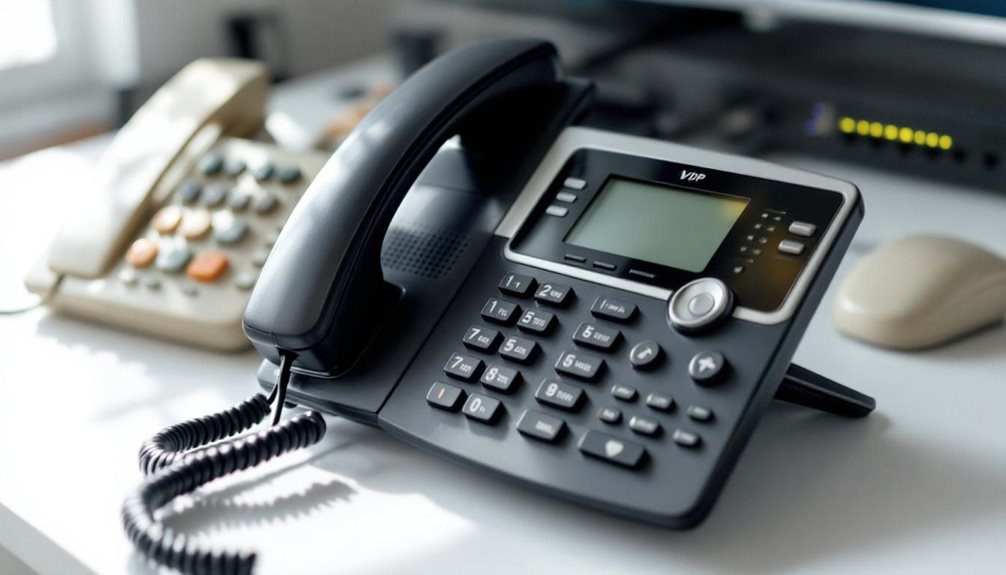VoIP doesn’t require special phones when users connect regular phones through adapters like the Grandstream HT801, which converts analogue signals to digital packets. However, dedicated IP phones such as the Cisco 8841 offer HD audio, programmable buttons, and better security features that standard phones can’t match. While softphone apps on computers provide another option, businesses typically benefit from dedicated VoIP handsets’ superior performance. The right choice depends on specific needs and budget considerations.
Understanding VoIP Phone Requirements and Compatibility Options
When businesses consider switching to VoIP phone systems, they often underestimate the technical groundwork required for a smooth changeover. Unlike traditional phone lines, VoIP needs compatible hardware that integrates seamlessly with internet protocols.
Companies face three main choices: dedicated VoIP desk phones like Polycom’s IP series, softphone applications for computers and smartphones, or wireless headsets for those who move around whilst talking. Essential VoIP devices include IP-enabled phones and headsets that connect through your network rather than traditional phone jacks. These devices must support Session Border Controllers which manage and secure VoIP traffic at the network edge to ensure reliable call quality.
Three hardware options define modern VoIP: dedicated desk phones, versatile softphone apps, or mobile wireless headsets.
Here’s the challenge – not all equipment works with every VoIP provider. Some phones only support specific protocols, whilst others require firmware updates to avoid security vulnerabilities. VoIP solutions require stable uncapped broadband for effective communication, making your internet connection just as important as the phones themselves.
Budget models might appear cost-effective initially but often lack essential features. Smart businesses check provider-certified equipment lists before purchasing anything. Many VoIP providers also offer mobile apps for enhanced flexibility, allowing users to communicate from virtually anywhere using their smartphones. Testing compatibility prevents discovering problems after installation when everyone’s already frustrated with the new system.
Using Your Current Phones With VoIP Adapters and ATAs
Many businesses balk at replacing their entire phone system, especially when those old desk phones still work perfectly fine. VoIP adapters offer a practical solution.
These small boxes, called ATAs (Analog Telephone Adapters), connect regular phones to internet-based calling services. Popular models like the Grandstream HT801 or Cisco PAP2T are affordable options that plug right into existing desk phones or fax machines. The adapters work by converting analogue voice signals into digital packets that travel over the internet, then converting them back for the receiving device.
Setup involves connecting the adapter to the internet router and phone, then configuring it through a web browser. While the initial setup requires some technical know-how—especially for dial plans and security settings—most adapters work reliably once configured. Many modern ATAs receive automatic updates to maintain software efficiency and security patches without manual intervention.
They support essential features like caller ID, voicemail, and even fax transmission through T.38 protocol. Businesses using VoIP systems should also consider implementing secure remote access solutions to protect their communications when employees work from different locations. For South African businesses watching their budgets, adapters make the VoIP shift manageable without scrapping functional equipment. A reliable fibre connection ensures optimal VoIP call quality and minimises latency issues that can affect voice clarity.
Choosing Dedicated VoIP Phones for Enhanced Features
While VoIP converters breathe new life into old phones, dedicated VoIP handsets open up a world of features that transform how South African businesses handle calls.
These specialised phones pack HD audio for crystal-clear conversations and programmable buttons that put frequently-used functions at users’ fingertips. Models like the Cisco 8841 or Grandstream GXP2170 handle multiple calls simultaneously – think juggling 12 conversations without breaking a sweat.
They integrate seamlessly with platforms like Zoom Phone, making video calls as easy as pressing a button. Built-in security keeps conversations private, whilst gigabit Ethernet ports simplify office networking.
For growing South African businesses, these phones scale effortlessly through bulk provisioning and customisable workflows that adapt to local business practices. Many models support unified communications features that integrate voice, video, messaging, and team collaboration tools into a single interface.
Whilst they require a higher initial investment than converters, the productivity gains often justify the expenditure for companies looking to modernise their communications infrastructure.
Setting up Your VoIP System With Electrocom in KZN
South African businesses seeking reliable VoIP solutions find a straightforward path through Electrocom’s wireless infrastructure across KwaZulu-Natal. Their setup process eliminates traditional phone line headaches. A technician checks if your location has clear sight to their radio towers, then installs a digital receiver that converts existing internet into crystal-clear voice service.
| Setup Component | What It Means For You |
|---|---|
| Feasibility Check | Free on-site evaluation confirms signal strength |
| Wireless Connection | No digging trenches or waiting for cable installation |
| PBX Integration | Works with current systems or new VoIP-enabled units |
| Speed Options | Choose 3Mbps for homes or 7Mbps for businesses |
The beauty? Everything runs through your current internet connection. Whether you’re managing a Pietermaritzburg office or connecting Greytown branches, Electrocom’s 16-year track record means fewer dropped calls and more productive conversations.
